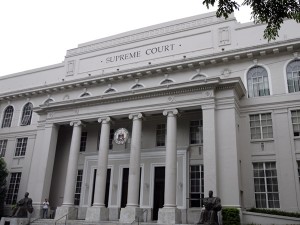Trade groups go to court over ‘alphalist’ demand
Five capital market and banking institutions and one private investor group have asked the Supreme Court to reverse the implementation of various regulations requiring the submission of an alphabetical list (alphalist) of portfolio investors receiving income payments and dividends.
On Sept. 4, a 56-page petition for certiorari and prohibition with application for the issuance of a temporary restraining order was filed at the Supreme Court. The petitioners questioned the constitutionality and validity of three related regulations issued by the respondents—Finance Secretary Cesar Purisima, Internal Revenue Commissioner Kim Henares and Securities and Exchange Commission chair Teresita Herbosa.
A copy of the petition, which ran up to 368 pages including the annexes, showed that the five petitioners were the Philippine Stock Exchange, Bankers Association of the Philippines, Philippine Association of Securities and Dealers Inc., Fund Managers Association of the Philippines and Trust Officers Association of the Philippines. The sixth is Marmon Holdings Inc., a Mandaluyong-based securities trading and investment company. They are represented by law firm Romulo Mabanta Buenaventura Sayoc & De Los Angeles.
The hotly debated regulations required all withholding agents to submit an “alphalist” of payees on income payments subject to creditable and final withholding taxes and prohibit the lumping into a single amount and account of various income payments and taxes withheld.
As applied to dividend income payments by listed companies to their investors, these also prohibit listed companies from naming PCD Nominee Corp. (PCD)—the entity which holds the title of all uncertificated, or scripless, shares traded in the stock market—as the payee of dividends. This was interpreted by some listed companies, through their transfer agents, to require the disclosure of the names, addressed and tax identification numbers (TINs) of the investors.
The questioned regulations—all feared to trigger a capital flight—were contained in the following: Revenue Regulation 01-14 issued by Purisima upon the recommendation of Revenue Commissioner Henares; Revenue Memorandum circular 05-14 issued by Henares and SEC memorandum circular No. 10 series of 2014 issued by SEC chair Herbosa.
Also, the SC was asked to stop respondents from further enforcing the questioned regulations and to declare the three regulations “unconstitutional and/or invalid, null and void and of no effect whatsoever.”
For over a decade, the petition said the PSE had utilized the scripless trading system required by the International Organization of Securities Commissions (IOSCO) as best global practice for securities regulators, including stock exchanges.
“The scripless trading system allows investors to buy and sell shares of stock in companies listed with the PSE without the logistical difficulties and obstacles present when shares of stocks are bought and sold using share certificates—an essential element of an efficient stock exchange considering the volume of share transactions made by investors every day,” it said.
But in the Philippines, the petition said this scripless trading system required the presence of a securities intermediary—in this case the PCD Nominee—which is considered by listed companies as the registered stockholder for the shares of stocks lodged by the broker-dealers with the Philippine Depository and Trust Corp. (PDTC) on behalf of investors, the petition said. As a consequence, it noted that PCD Nominee was also the payee of the dividend payments distributed by listed firms.
The petitioners argued that having PCD Nominee around not only ensured the efficient transfer of shares but also preserved the integrity of the market, which otherwise could be compromised if investors were identified by unauthorized third parties.
“Respondents, in the guide of tax administration, have jeopardized not only the stability of the Philippine capital market but also the liberty, properties, privacy and security of the market participants, which include the petitioners,” the court filing said.
As such, petitioners invoked the writ of certiorari or prohibition, which is issued by the court to correct errors of jurisdiction committed not only by a tribunal, corporation, board or officer exercising judicial, quasi-judicial or ministerial functions but also to undo any act of grave abuse of discretion amounting to lack or excess of jurisdiction.
“In this case, respondents acted with grave abuse of discretion amounting to lack or excess of jurisdiction when they issued the questioned regulations in violation of the constitutional rights of the petitioners and their customers to due process,” the petition said.

